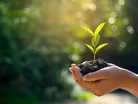Nestlé accelerates sustainable packaging transformation

The organisation has confirmed a number of initiatives that include a US$30mn investment to increase food-grade recycled plastics in the US, a refillable system for pet food in Chile and a first-of-its-kind recyclable paper packaging for Maggi bouillon cubes in France. Currently, 87% of Nestlé’s packaging is already recyclable or reusable.
Véronique Cremades-Mathis, Global Head of Sustainable Packaging, Nestlé, commented: “We have made strides in our transformative journey towards a waste-free future, but we know that we have more work to do. As the world’s largest food and beverage company, we’re committed to putting our size and scale to work to tackle the packaging waste problem everywhere we operate.”
Despite dealing with the challenge of COVID-19, Nestlé’s commitment to sustainable packaging has remained the same. The organisation continues to play an influential role in helping solve the issue of plastic pollution through its three-pillar approach launched in January 2019.
Pillar 1: Developing new packaging
- Transitioning to paper packaging across various formats. For example, Smarties sharing block, a popular colour-coated chocolate confectionary product, is available in a recyclable paper wrapper in the UK.
- Gerber and Piltti baby food use a first-of-its-kind, single material pouch designed to increase recycling value.
- Nespresso introduced new capsules made with 80% recycled aluminum, an important step towards circularity.
- Nestle’s water business has doubled the amount of rPET used since 2019 across its still water portfolio in the US to 16.5%.
Pillar 2: Shaping a waste-free future
- In August 2020, Nestlé Philippines reached plastic neutrality. This meant Nestlé collected and co-processed the equivalent amount of plastic as contained in the products sold and prevented the further flow of plastic into landfills and oceans.
- In collaboration with Project STOP, Nestlé creates a sustainable waste management system that helps reduce ocean plastic pollution in Indonesia.
- The firm began on a trial to collect, sort and process soft plastics in Australia.
- Nestlé is increasing reusable and refillable options for its Petcare and soluble coffee products through collaboration with the startup company MIWA in Switzerland.
- Nestlé advocates for the design and implementation of affordable and effective mandatory Extended Producer Responsibility schemes. It identified 20 countries, which consists of 50% of the company’s plastic usage, where the company will support recycling rates and waste management infrastructure.
Pillar 3: Driving new behaviour
- Nestlé is implementing a sustainable packaging education and training programme for more than 290,000 employees in a bid to accelerate behavioural change and allow the company to meet its packaging aims.
- Nestlé introduced a digital platform to allow its consumers to dispose of their packaging waste appropriately in Italy.
- Nescafe Dolce Gusto introduced a consumer education campaign to promote recycling in Germany and Mexico.
- Nestlé is accelerating positive change through school programmes, such as the Tunuyan Verde project in Argentina.
- The Algramo, MIWA and Loop pilots of refillable and reusable packaging solutions provide a new shopping experience.
For more information on Nestlé’s sustainability journey, click here.
- The University Manufacturing Circuit Boards from LeavesSustainability & ESG
- Schneider Electric's Commitment to Sustainable ManufacturingSustainability & ESG
- Lenovo & Saudi Alat Building Green Manufacturing FacilitySustainability & ESG
- Nissan Brings Biodiversity to the Factory through RewildingSustainability & ESG

